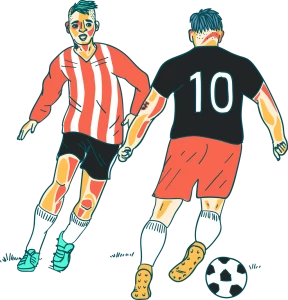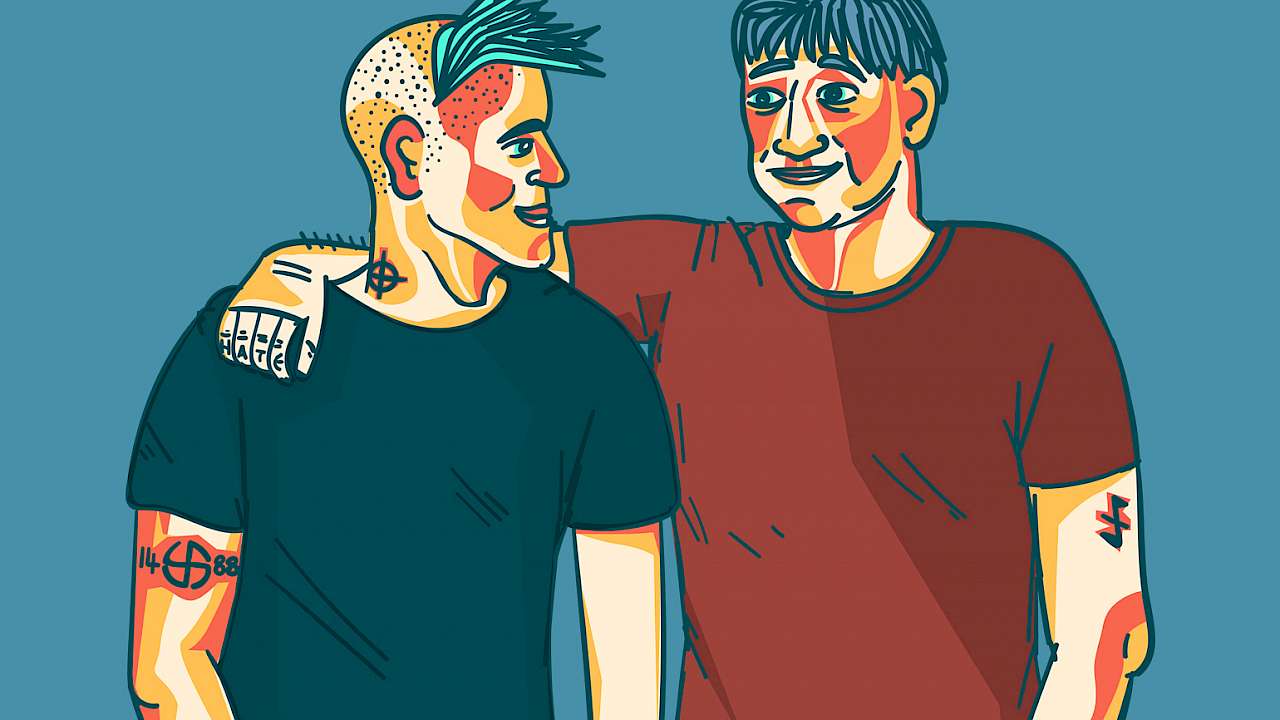Leaving an extremist environment is difficult. Some individuals need support to handle it, but the potential benefits in helping reduce acts of violence and potential terror attacks can be significant. An understanding of both these benefits and the complexity of the process of leaving extremist groups has led to a global increase in exit intervention programmes for extremists.
I have undertaken several months of anthropological fieldwork at EXIT, a Swedish Non-Governmental Organisation (NGO) that supports right-wing extremists’ disengagement. During this time, I came to understand why the transition from being a right-wing extremist into a democratic citizen in western liberal society is so difficult.
My research is informed by the understanding that an individuals’ development of an extreme identity is the outcome of a situated learning process. ‘Situated learning’ focuses on the relationship between learning and the social situation in which it occurs. For example, a member of a right-wing group acquires their cultural knowledge through being part of the group, which over time shapes the individuals’ way of interpreting the world and cements what they see as the key issues of the day.
Any newcomer to a fresh social setting goes through this process of learning to get the ‘native’ group's view of the world. However, because we have different experiences, positions and interests we still have unique understandings within the social worldview.
This understanding of the importance of the social setting, coupled with the unique ways in to, and interpretation of it helped show me what participation in an extreme group can entail, what people looking to leave an extremist group can need, and how to support them in this process.
After-effects of participation in extreme groups
Individuals who join extremist right-wing groups experience two parallel and mutually reinforcing processes: inclusion and socialisation into withdrawn and stigmatised communities, whilst severing ties with 'normal' society. The process is most commonly mutually reinforcing due to the stigmatisation of being associated with a neo-Nazi group.
Through immersion in the everyday practice of this sort of sub-culture, people – right-wing extremist or not – also form bodily and mental dispositions associated with it. For example, the emotional side of an extremist life often involves intense feelings of hatred, aggression, violence and highs of adrenalin causing some individuals to experience symptoms similar to post-traumatic-stress-disorder (PTSD).
This intense emotion and withdrawal from wider society can leave former extremists struggling when they attempt to leave groups. These struggles can include social disabilities in the form of finding it hard to resolve conflict, manage stress as well as cope with feelings of loneliness, shame and meaninglessness.
Aims of the EXIT programme
EXIT Sweden is one of the oldest organisations of its kind and over the years it has developed into a very successful example of an exit program. This is due to several factors, including its use of former right-wing extremists (‘formers’) as mentors. These mentors, using therapeutic dialogues and activities, support people seeking to leave extremist right-wing groups.
By using ‘formers’, EXIT creates legitimacy in a very hard-to-reach target group. Their shared past positions mentors as role models to the mentees, as they are living proof that leaving the extremist right is possible.
People involved in the extremist right can become accustomed to world-views, such as the idea that there is a conspiracy against society, as well as believing that all people outside the group are enemies to be fought. With this in mind, the main goal of EXIT's approach is to support the mentees in developing alternative worldviews, ways of self-understanding and identities.
Supporting individuals to leave the extreme right
 For any mentor-mentee relationship to be successful, trust has to evolve between the two. This helps the mentee to become open to their mentor’s advice and example. Initially, they can spend months doing sports and other kinds of activities to develop a strong relationship. As they establish mutual trust, the mentors will help the mentees identify activities that they enjoy. Encouraging the mentees to engage in new social environments is seen as essential to help sustain motivation to leave their former extreme group.
For any mentor-mentee relationship to be successful, trust has to evolve between the two. This helps the mentee to become open to their mentor’s advice and example. Initially, they can spend months doing sports and other kinds of activities to develop a strong relationship. As they establish mutual trust, the mentors will help the mentees identify activities that they enjoy. Encouraging the mentees to engage in new social environments is seen as essential to help sustain motivation to leave their former extreme group.
This time also marks the beginning of a process whereby the mentee learns to identify and express emotions – other than hate and aggression. The mentor will also discuss the personal challenges and issues that the mentee faces, and give examples to help with these from their own life. These can be everyday examples such as recounting discussions with their girlfriend over who has to do the cleaning – to show the importance of compromise. They can also be life-changing examples, such as their experiences of transitioning out of extremist groups.
As they establish mutual trust, the mentors will help the mentees identify activities that they enjoy.
Using these personal experiences, especially the day-to-day ones, helps to broaden the mentees’ perception and reflection on their own journey and expand their understanding of themselves and others.
Whilst the mentors represent a different world (society outside the extremist milieu), their shared experiences help challenge the often rigid world view of the mentees. The mentors introduce alternative perspectives on world views by pointing out different signs of significance and providing additional information, bit by bit. These, over time, can help mentees draw different conclusions from those informed by their extreme world-view.
The mentors do not tell the mentees what is right or wrong; rather they help the mentees identify it themselves by increasingly questioning or adding new perspectives to the mentees' perceptions. This gradual expansion of the context for world views, coupled with the avoidance of offering premade answers, seems to make it much harder for the mentees to reject new insights and revert to old perceptions.
The development of an alternative life
 While a lot of exit interventions and programs are dialogue-based, EXIT’s approach also entails getting the mentee to engage with an alternative environment. They take this approach because formers can struggle with particular ways of acting, which they developed as a consequence of their engagement in an extreme environment. This makes it difficult for some to decide what to do in certain situations when they cannot react with aggression, violence or intimidation.
While a lot of exit interventions and programs are dialogue-based, EXIT’s approach also entails getting the mentee to engage with an alternative environment. They take this approach because formers can struggle with particular ways of acting, which they developed as a consequence of their engagement in an extreme environment. This makes it difficult for some to decide what to do in certain situations when they cannot react with aggression, violence or intimidation.
For example, Kate, a former right-wing extremist who had left an extreme group ten years previously, explained to me that in certain situations she still had a very strong inclination to act aggressively, which she did not want to. She still had doubts about how to react to these situations. She explained to me in an interview:
I think the thing was that, when I came out , I was an adult, and this thing about grey areas – compromises – for example, to try to see both sides of the coin – just took so MUCH damned time. And it might be what made it so turmoil-ish with me in the beginning when I left, especially in my personal life, to try to find out about all these things; that I knew who I was, but I did not know who I should be and how to learn it, and I can still feel confused; WHAT DO I DO NOW?
Well, it has to do with having an instinct, but you also know somewhere that the instincts I get about how to behave, it is not like you ought to behave if you ought to consider how society perceives it. Because I often feel like ... I am in such a way that if I get mad, I can get really mad, and I realise that now I am very angry about a tiny little thing, and I need to back off. But I am still beside myself with rage over things, for example, I will be furious at someone, and then I must just try to back off and say; 'I'm very sorry, I know I overreacted'. But the fact is that it is not all-natural, and it may well be that it will never be in such a way that it becomes natural to think twice and see...
The mentees participation in new social activities helps to deal with these doubts, and are crucial to help them develop alternative social relations and skills. They also help them acquire new routines on which their successful reintegration into society seems to depend.
The EXIT Sweden programme, and my research into it, shows that the transition from being a right-wing extremist into becoming a democratic citizen depends in many aspects on a situated learning process. This is as complex as peoples’ initial development into becoming a right-wing extremist and necessitates a lengthy re-socialisation into mainstream society.
Read more
- Tina Wilchen Christensen. 2015. A Question of Participation – Disengagement from the Extremist Right: A case study from Sweden. Roskilde: Roskilde Universitet. Available at: https://rucforsk.ruc.dk/ws/files/56384428/twc_fin_ny.pdf
Copyright Information
As part of CREST’s commitment to open access research, this text is available under a Creative Commons BY-NC-SA 4.0 licence. Please refer to our Copyright page for full details.
IMAGE CREDITS: Copyright ©2024 R. Stevens / CREST (CC BY-SA 4.0)







